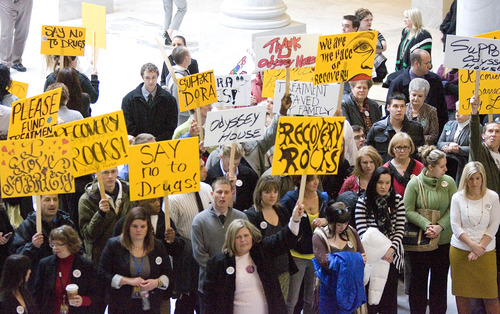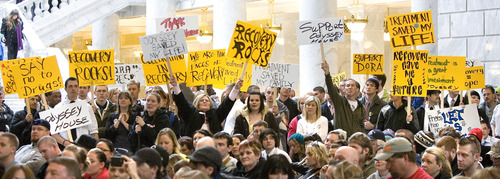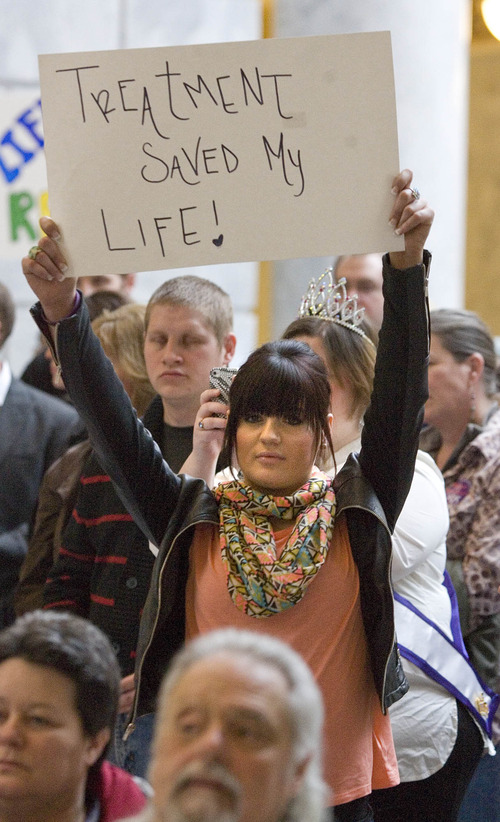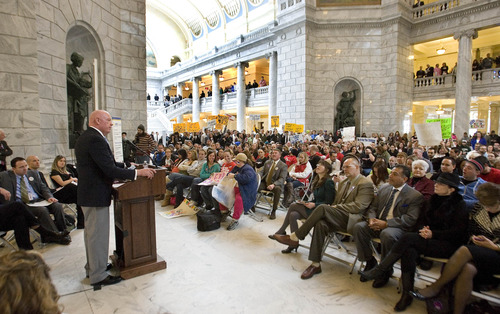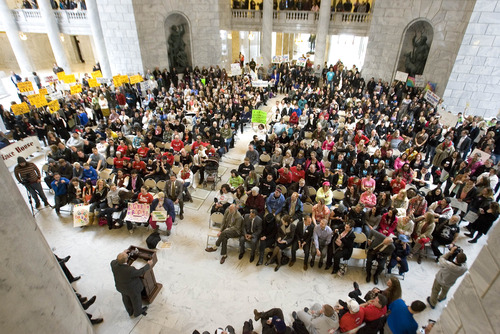This is an archived article that was published on sltrib.com in 2013, and information in the article may be outdated. It is provided only for personal research purposes and may not be reprinted.
Several hundred Utahns coping with mental health disorders and addictions gathered in the Utah Capitol Tuesday to let lawmakers know "we recover and we vote."
"We want the funding for these programs to stay in place," said Laura Cullen, a volunteer with Utah Support Advocates for Recovery Awareness (USARA). The state Department of Human Services is seeking $131 million to sustain mental health and substance abuse treatment programs, including school-based counseling for troubled teens, mobile crisis teams and drug courts that help non-violent offenders recover from addictions.
That's $3.5 million less than was budgeted last year, but enough to keep programs afloat — for now.
Expanding Medicaid would mean more federal funding for these programs, an optional provision of the Affordable Care Act that isn't favored by Utah Republican leaders. Regardless, demand for behavioral health services is growing and the funding needs aren't going away, said Adam Trupp, legal counsel for the Utah Association of Counties.
Indeed, some programs face cuts ordered by Congress to pay for the health reform law.
The Utah State Hospital will lose $1.2 million over six years under the rationale that uninsured patients served there will have other forms of health coverage. "The feds are anticipating most of those individuals will convert to Medicaid, so why would they want to double pay, " said Patrick Fleming, Salt Lake County substance abuse director.
Mary Jo McMillen, executive director for USARA, told the crowd that she personally been sober for 27 years.
"Standing here with all of you today, I know that personal freedom . . . is to be free from our addiction," McMillen said. "These afflictions that we have, it's possible to recover."
Rebecca Glathar, executive director of the National Alliance on Mental Illness-Utah, reminded individuals in the crowd that they are not alone, even though mental disorders can seem very isolating. She also spoke of the barriers that many encounter in trying to access treatment.
"We regularly hear of the tragedies and heartache that don't make it on the front page the newspaper," she said. "The sister who is afraid of the bizarre and violent behavior of a brother toward her parents. The mother who is desperately trying to find services for her suicidal 10-year-old...The wife who loves her husband but who has watched him lose yet another job to his disability. We watch with horror as another life is lost to a violent act, a Taser-related death, a suicide."
Rep. Mike Noel, R-Kanab, empathized with the crowd.
"You are my heroes," Noel said, speaking of his childhood with an alcoholic parent. Noel also talked about his older brother, who is in a federal penitentiary due to drugs and is dying of liver failure.
When Noel mentioned the $28,000 per year it costs to house a man or woman in prison and how those funds could be better used for treatment, the rotunda rocked with thunderous applause.
Sen. Howard Stephenson, R-Draper, spoke of his ongoing support of legislation to give recovering addicts a fresh start. He is the Senate sponsor of HB33 — termed "Jean Valjean's law" — which would provide an expungement process for drug-related offenses.
Scores of "Addict to Athlete" members participated in the rally, representing thriving recovery groups in Utah and Salt Lake Counties. And the Layton-based Women's Recovery Center had several representatives present.
One participant held a homemade sign that said, "I'm just a hopeless hope fiend," another "Jail hurts, treatment works!"
Julie Hardle manages a Salt Lake City-based recovery center for OptumHealth. She shared her personal journey with the crowd, speaking of the disorders she faced — serious mental disorders combined with substance abuse — and of her mother's steady belief in her talents and gifts.
"I know that treatment works," Hardle said. She added she's proud to pay 23 percent of her earned income in taxes to help services she feels are sorely needed for the growing number of people who struggle with mental illness and substance use disorders.
twitter: @catmck


